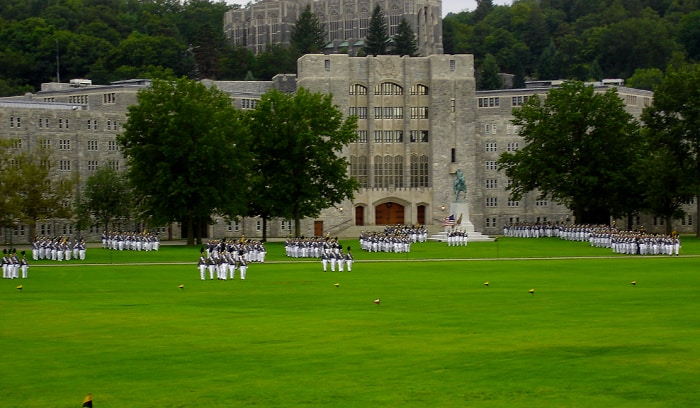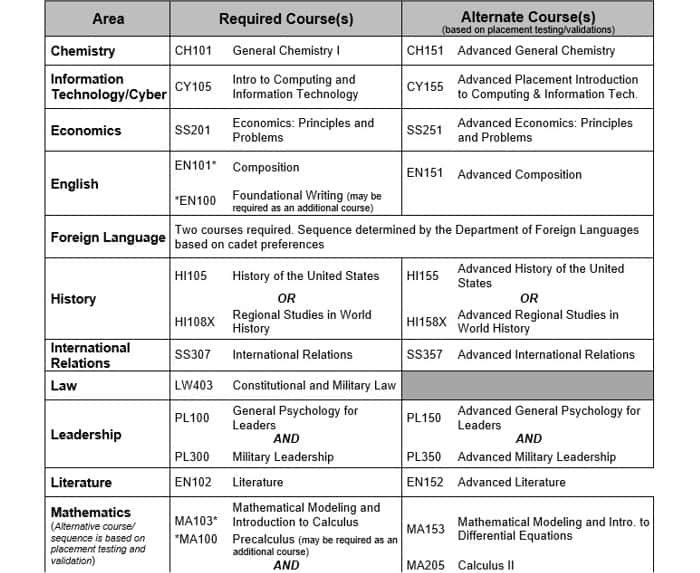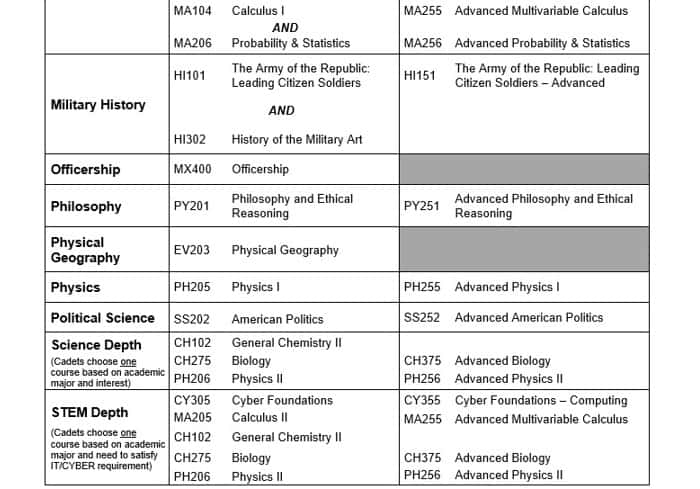What percentage of West Point graduates stay in the military? There is no specific value disclosed online, but we have curated two for your reference. One is from Quora (stating an example of 68%) and the other is from an article on The Baltimore Sun (stating 80% in 1980s and 67% for the class of 1994).
Table of Contents
Background Context
West Point is a service academy in New York. It was founded 220 years ago in 1802.
The campus covers 16,080 acres and the center of it is a national landmark. On-premise, there are many monuments and statues. For example:
- The Washington Monument on the Plain
- The Thayer Monument on the Plain
- The Eisenhower Monument on the Plain
- The MacArthur Monument on the Plain
- The Kosciuszko Monument on the Plain
- The Sedgwick Monument on the Plain
There is a cemetery, called the West Point Cemetery. Notable faculty and graduates rest here.
You can also find multiple athletic facilities and a museum at West Point.
To be able to apply to West Point, you must be at least 17 years old but younger than 22 years old and be a U.S citizen. You cannot be married, pregnant, or have any legal obligation to support a child/children.
In addition, you must have a service-related nomination. Competitive scores on a college entrance exam, such as the ACT or SAT, are also necessary.
1. Curriculum
The academy’s educational philosophy and mission is to educate, train, and inspire the Corps of Cadets. So, each graduate can become a commissioned leader of character and committed to the values of “Duty, Honor, Country.”
To do this, the academy runs the WPLDS, which stands for West Point Leader Development System and has seven Academic Program Goals, as follows:
- Communication – Graduates communicate effectively with all audiences
- Critical Thinking & Creativity – Graduates think critically and creatively
- Lifelong Learning – Graduates pursue continued intellectual development
- Ethical Reasoning – Graduates recognize issues and apply ethical perspectives in decisions
- STEM – Graduates apply science, technology, engineering, mathematics concepts to solve problems
- Humanities & Social Sciences – Graduates apply concepts to understand human conditions
- Disciplinary Depth – Graduates apply knowledge and methodological approaches
Every student takes 24 core courses, three courses in an engineering sequence (if they are not majoring in engineering), and at least 13 elective courses to specialize and explore a certain area in depth.
Here are the 24 core courses:
There are over 35 majors and 15 minors offered.
You can find more detailed information about West Point’s academic program here.
2. General Timeline At West Point
- In the Freshman year, Cadets learn about military life and transition from civilian life with basic training, warfighting introductory courses, and academic courses like English, Math, etc.
- In the Sophomore Year, Cadets begin to apply what they have learned to field training. They are introduced to the fundamentals of Army operations and take courses, like physics, politics, and foreign languages.
- In the Junior year, Cadets begin to serve as squad leaders for basic training to acquire leadership experience. They also continue to take courses in international relations and platoon operations.
- During this year, Cadets commit to serving as an Officer in the Army after graduation. Specifically, Cadets will be commissioned as a Second Lieutenant. The commitment will be for 8 years, of which 5 years are in active duty and 3 years are in the Army Reserve.
- In their final year, Cadets start applying for jobs in Army branches. In addition, they prepare for leadership roles by training cadets and learning about leadership development, military history, and chain of command.
- During this Senior year, Cadets will find out which branch and specialized field they will enter. In this case, the Cadet’s needs and the Army’s needs will be considered.
- Note: The Army has specialized occupational fields also known as “branches.” Every branch has a distinct area of technical and tactical expertise.
- During this Senior year, Cadets will find out which branch and specialized field they will enter. In this case, the Cadet’s needs and the Army’s needs will be considered.
3. General Timeline After West Point
Once you graduate and complete all the undergraduate degree requirements, you will be commissioned as an Officer in the Army, and you will receive the gold bar of a Second Lieutenant.
Check out a video of a West Point Military Academy graduation here.
After graduation, Cadets will take a Basic Officer Leader Course to learn about general Army operations, planning, and training.
Then, Cadets will learn material specific to their branch to become competent in the technical aspects of their occupational specialty.
Next, Cadets will be sent to an Army unit.
There, they will acquire experience in their occupational specialty and continue to do so for three years. A Cadet may lead a cyber operations team, helicopter aviation platoon, or vertical engineering unit.
In the fifth year, the Cadet can either advance in their Army career through more training and education or finish their commitment and return to civilian life.
In the former case, the Cadet will prepare for higher levels of
- Leadership,
- Responsibility, and
- Specialization
If a Cadet chooses to do this, the Army will pay for all their training, education, and travel.
Eventually, the Cadet can:
- Work in the Pentagon,
- Serve as a military attache in an overseas country or
- Command large troop unit
4. Why Students Choose To Become Cadets At West Point
One reason why students choose West Point is free tuition for four years and an annual stipend of over 10 thousand dollars – totaling up to more than $225,000.
- After 60 days in service, all active duty members are registered in the Thrift Savings Plan, which is similar to a civilian 401(k) retirement account.
- They acquire an automatic 1% of base pay.
- After 2 years in service, the military will match up to 5% base pay.
- After 20 years in service, active duty members will earn 40% of their base pay.
- After 30 years in service, active duty members earn up to 60%, reduced medical care for life, and other benefits.
Percentage of West Point Graduates Stay in the Military
There are various answers online.
Here is one from a user on Quora:
68% of his classmates in the class of 1928 left the service before the 20 year mark. His class had 25 Cadets, and 8 retired from the Army after 20 or more years. The user himself left after 6 years.
His take is that whether people stay depends on deployments and promotion opportunities. If a Cadet is promoted Major, then he is much more likely to stay because retirement is in sight. However, promotion to this rank is influenced by whether the Army is growing or shrinking, as well.
Here is one from The Baltimore Sun’s “Military’s Loss, Private Sector’s Gain” article:
The number of graduates staying in the military after 4 years dropped from over 80% for the classes that graduated in the 1980s to 67% for the class of 1994.
This gives us insight that many graduates leave after their mandatory commitment and although this has decreased, as of 1994, the rate was still higher than 50%.
- Note: The departure rate is also an issue for the Naval and Air Force Academy, though the navy retention rate and the Air Force’s rate are not disclosed.
Frequently Asked Questions (FAQs)
What is West Point’s Dropout Rate?
According to the collegetuitioncompare website, the transfer-out rate is 2%.
What is West Point’s Graduation Rate?
According to the collegetuitioncompare website, the graduate rate is 85%.
What is West Point’s Acceptance Rate?
According to the usnews website, the academy is very selective. The acceptance rate is only 9%.
Do West Point Graduates Get Promoted Faster?
No strings are pulled. But graduates are prepared for excellence, so it is not too much of a surprise if they do get the opportunity to rank up.
West Point graduates rank Second Lieutenant when they first start their military career. But most climb the ranks. Here are some of the academy’s notable graduates:
- Andrew R. Morgan (Class of 1998) – The first Army doctor and Special Forces officer to become an astronaut. He has been one since 2013.
- Kristin Baker (Class of 1990) – The first woman Brigade Commander.
- Barry McCaffrey (Class of 1964) – The deputy U.S Representative to Nato between 1988 and 1989; the Commander-in-Chief of U.S Southern Command between 1994 and 1996; the Director of the Office of National Drug Control Policy between 1997 and 2001.
- Note: If you want to find a particular alumni, you can check out the United States military academy Association of Graduates for West point at this link.
Conclusion
Congrats! You have finished reading this article on “What percentage of West Point graduates stay in the military?” Hopefully, you have gotten the information you need. Leave any thoughts and questions in the comments below. And please help us share this article with other readers!

I am Everett Bledsoe, taking on the responsibility of content producer for The Soldiers Project. My purpose in this project is to give honest reviews on the gear utilized and tested over time. Of course, you cannot go wrong when checking out our package of information and guide, too, as they come from reliable sources and years of experience.





